#I love the notion of characters rejecting the narrative
Explore tagged Tumblr posts
Text
I've been a fan of the books for half my lifetime, so I'll jump in and say that the framing of Claudia's murder in the show is fundamentally different from that in the book. The show actually rejects the notion she was 'doomed by the narrative' (overused and frankly exhaustingly reductive phrase, much like the assertion that all tragedies are inevitable at their core). In the meta sense, yes, there would never be a story if Anne Rice hadn't lost her daughter, and so any adaptation of Interview would necessitate Claudia's death.
In the case of show!Claudia in particular, the framing of her tragedy is that in-universe, she wasn't doomed; she broke the cycles of abuse, found a loving partner who accepted her completely, and lived happily ever after for a time, contrary to the coven/Lestat's assertions that her 'defect' made her life unlivable (which as I read it almost plays as a disability narrative). She was killed as collateral to Armand's jealousy and because of the coven/audience's racism. "Claudia was going to die no matter who did it" is true on a meta level, but a point is made of the injustice and the racialized nature of her death in the show, and how she was robbed of the happy life she had carved out for herself against all odds.
Similarly, unlike his book counterpart's apathetic acceptance, show!Louis is not aware of the extent of responsibility Armand bore in her fate, and is gaslit for almost a century into bedding down with his daughter's torturer and murderer, so the additional deception and cruelty counts for a lot. I agree it's silly to want 'accountability' from fictional characters, but at the same time, the reason people want there to be narrative consequences (such as Louis not forgiving Armand, which is imo more than reasonable) is because the show's recontextualizations tell the story from the perspective of a cruel injustice, and not the meditations of a grieving mother working through her own process. Claudia in the books does not dignify the trial with a response; Claudia of the show raises her voice against those who would deny her that to assert that she does, and always did, matter, despite being treated so often like she didn't. No narrative fallout from the true nature of her death would tacitly devalue her further -- the very thing she called out at the trial. And if Claudia 'needs' to die for there to have been a story, if it is the great tragedy of the show, then yes, narrative consequences for those responsible should follow suit.
I wonder if theres a meaningful split of opinion between people who were familiar with the plot of interview with the vampire before they watched the show and those who went in blind when it comes to ascribing blame for Claudia's death. Just because I see a lot of people who are very concerned with whose fault it is and holding those characters accountable, which was never something which really stuck out to me as particularly important? But I also knew Claudia was going to die going into the show. Being mad at Armand or Lestat for her death feels like getting mad at Tybalt for killing Mercutio. Like yeah in universe its murder but I live in the real world and in the real world its a tragedy and Claudia was going to die no matter who did it. Anne Rice killed Claudia. It doesn't really matter what weapon she used. We can talk about blame for sure but "accountability" or "punishment" seem pointless to me. But maybe I'm just numb to it bc I knew it was coming, and if it took you by surprise you'd probably feel different.
135 notes
·
View notes
Text
Sorry for the Homestuck 2 hot take, but I really like James Roach’s new direction for the project. You can really feel the joy behind it, makes it feel fun again.
#homestuck#homestuck 2#The Epilogues and Homestuck 2 (with a bit of Homestuck proper) felt like it had a lot of anger behind them#I love the notion of characters rejecting the narrative#But with Homestuck it just felt like the author(s) punishing the fans for being fans#Which is not enjoyable#To make or read#It’s really easy to internalize the crazy and the negative#Of how people react and engage with your work#That it affects you deeply and negatively#I’m glad James Roach hasn’t let any of the Homestuck 2 negativity get to him as he takes over the project#And really shares just why he likes Homestuck#delete later //
68 notes
·
View notes
Text
The stars will be our bed
I'm seeing a very popular narrative that asking for physical sex during Gale's act 2 scene is better for his character development, and the astral scene is bad for him. Or at least not as good. While I do prefer the astral version more, I disagree with the notion that either one is better for Gale's plot development. I've done both options depending on the what felt right for that specific Tav at the time. As always, if that's the narrative you want to build, there's nothing wrong with it.
For me personally I think both are narratively sound for his character development. Yes Gale needs to know he doesn't need magic to be loved, but Gale also loves magic. It's his life, his passion and his artistic medium of choice. What he needs is balance, not total rejection. You want the man, and the magic.
"Tactful, Bowing to the player's desires"
If you insist on regular sex, that's the devnote that's attached to it. Gale is acquiescing to what you, the player wants. Gale wanted to share his magic with you, but you refused. He doesn't care either way, as long as he's spending the night with you. The approval numbers are the same. He obviously prefers the astral sex because it's what he's used to and confident in, but either is fine.
One thing we have to remember is Gale also uses magic to find connection. In the act 1 weave scene, Gale and you share thoughts over the weave. It's exactly what he's trying to do in Act 2 as well. It's a mind meld sequence using the weave. I don't think Gale is trying to use magic to as a front in this scene, despite the "I can wow you" sentence if you refuse. I think he's trying to share his inner self with magic as the canvas, and connect with you in this most intimate way. It's akin to Fane's scene in DOS2 where you share Source with each other and also mind meld.
Gale wants to distill a lifetime's worth of affection into one night because he feels he will die soon. The scene is his "Last Night Alive". Gale, the artist of the weave puts on his final and private show for his beloved. He weaves stars and invites light to the land of shadows. He's prepared for days for this whole sequence, and you only need to trust him.
If you do he leads you into his innermost world. First, where he feels safest, and the balcony that brings him comfort. Then the book of a thousand days and nights filled with his love for you. The amount of time he wishes he had left to show you his affection, physical or emotional.
But he only has one night.
"There are endless worlds out there. Countless ways to declare love. Infinite ways to express it. Too much for one night.. but we shall try."
The astral scene is him trying. He multiplies as he refuses to let go your hand. He caresses every part of your mind, body, and soul. Gale tries desperately to sear every fiber of your being, of the one he loves onto his own soul. He wants to feel everything you do, and the weave is capable of that.
"Your bodies and minds weave together in a masterpiece of intimacy. Never have you felt such wonder, such love - as vast as the universe itself, and just as heavenly. "
You are one and the same that night. Where Gale ends and you begin is a mystery; he is lost in you and you in him.
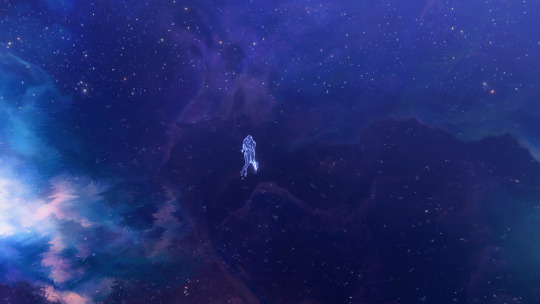
"We are all sensual vessels. Illusory magic lets us sail farther, and feel more deeply."
The scene is beautiful, both narratively and visually. This is not a man trying to use magic to demonstrate his worth so you won't leave him. This is a man trying to use magic to weave a tapestry from two spools of thread in one night. It's ok to let him do so. It's also ok to remind him he doesn't need to. Whichever feels right in that moment is the right choice.
They all end in giving Gale renewed hope. Magic was merely the medium on which it blossomed and thrived. Whether from a bed of stars or a bed conjured under it, your love is what gave it life.
Thanks for reading this way too long cold take.
822 notes
·
View notes
Text
I’m going to be putting into words arguments that I have made that are, more often than not, fragments of an overarching whole. Feel free to add on if I missed any.
A rejected bond trope cannot happen in a book that does not also share Lucien’s POV. Not only would this be the first rejected bond trope that SJM would have used in her entire catalogue of work, but it directly affects the males more than the females—not having Lucien’s immediate POV in the following chapter would diminish the climatic notion of rejecting the mating bond. The bond is just as much Lucien’s as it is Elain’s.
Following along, had Lucien been rejected in the previous book, the reader would now have to wait years for his POV in his own book where the reader would have to go back in time to see his immediate reaction, deal with the consequences of a rejection, his plethora of plot points, and also him somehow falling in love with a human woman. Not only is he going to miraculously bounce back from such a soul crushing rejection—in all meanings of the term—but he is going to manage to move on enough to fall in love with someone else.
Lucien and Elain have to resolve the mating bond before she can either reject it, and/or get with Azriel. That means, from a literature standpoint, that the reader needs to actively see Elain and Lucien exploring the bond and getting to know one another, finding out that they just do not work, and continuing on from there. If Elain just up and rejects the bond and decides to be with Azriel, that is both anticlimactic and a disservice to Azriel. Choosing love means exploring the other option, rejecting it/fate, and still choosing to be with someone else. If the bond is never explored, did she really choose Azriel for love?
Elain and Lucien are within the same plot arc—Azriel has his own established plot arc, away from Elain. If SJM truly intended for the next book to be told from Elain and Azriel’s POVs, she would have placed them within the same overarching plot arc. Instead, she separated them for two straight books and made certain that it was Lucien also tied to Koschei, and it was Azriel tied to Dusk, Illyrians, Gwydion and Truth Teller, and Valkyries.
If Elain and Azriel were meant to be endgame, SJM would have needed to already resolve/begin resolving the mating bond between Elain and Lucien, and she would not have placed Gwyn within the vicinity of Azriel—especially not in his bonus chapter—in the way in which she did. SJM would have titled the ACOSF bonus chapter and marketed it as the Elriel chapter, similarly to Nessian. However, she did not, she marketed it as Azriel’s bonus chapter and she included two women.
If Elain and Azriel were endgame, and are so blatantly obvious, what would the need for a red herring be for them? Elain’s mating bond is tension enough, why bother adding another female character into the mix? Why move so much of Elain and Azriel off page? Why have all of their biggest scenes be told from either someone else’s POV, or in a bonus chapter that many readers still have not found out about?
The ‘Elain in Black’ entire paragraph was meant to draw the reader in. Cassian, who should have been focused on Nesta, harped on the Night Court black draining the life from Elain. “She had to dress down for Nesta.” That is a fanon interpretation and not backed by canon; Elain is the most beautiful Archeron sister and would have outshined Nesta in that regard no matter what. Pair that with Nesta in the next chapter also confirming that the color of the dress was what was ill-suited, not the actual dress. Following by saying that Elain radiated good health in an amethyst dress, written in a similar way that the Day Court entourage was described in ACOWAR. Pair this with other characters expressing that Elain does not fit in with the Night Court, and the foreshadowing is there.
Anything that Vassa can offer to the narrative, the reader can learn from both Lucien and Elain—Vassa is not needed for a POV, as she has nothing she can offer that would create a compelling story. She would, ultimately, just be a love interest. Anything about Koschei, we can learn from Elain’s visions and any stories that Vassa tells Lucien. Anything about Vassa in general, we can learn from Lucien. The reader already knows what happened to Vassa and the readers know about her curse and that Koschei still expects her return. She is going to be a side character with her own love interest, similarly to Amren and Varian.
I am certain that there are more, so feel free to comment and/or reblog with some! Elain and Azriel were never meant to be taken as seriously as they have and do not make much sense from a narrative perspective. They do not share any overarching plot arcs, they are wildly incompatible with one another, and there is so much foreshadowing and symbolism between Elucien and Gwynriel that wouldn’t need to be there if Elriel truly was endgame.
Thank you for coming to my TEDtalk.
#acotar#anti e/riel#anti vassien#sarah j maas#acotar analysis#elucien#gwynriel#lucien vanserra#elain archeron#gwyneth berdara#azriel#vassa
72 notes
·
View notes
Text
I don’t get the Lan Zhan hate some people have? I don’t get some people calling him a cunt or bastard (derogatory)? Second to maybe Wen Ning, Lan Zhan deserves being hated the least. He is a flawed character. He made tons of mistakes. But so much of his positive attributes and actions completely outweigh all of that. Like, one of the most unique things about Lan Zhan is that despite the pain of losing Wei Ying and despite the punishment he received for it he did not dwell on resentment. He had a right to but he didn’t. Instead he worked on bettering himself. He worked on bettering his sect. There was a post that talked about how Jingyis existence and bright, loud character is a far reach from what most Lans are usually expected to be. But the fact that he’s not really scolded for being who he is and instead the narrative even frames him as being in the right really shows how much the Lan sect had changed over the years and it’s pretty clear that Lan Zhan is responsible for it. Cause Qiren liked the status quo and Lan Xichen was satisfied with it and didn’t really see an issue so they wouldn’t have a reason to create any change.
And for a sect that’s famous and known for its rigidity that is a significant feat. Then you have the fact that in the 13 years Wei Ying was dead Lan Zhan had created a reputation of being someone you could rely on for help and aid without needing compensation like other sects. In a time where cultivating has become a borderline business, a status quo that is openly accepted, Lan Zhan actively rejects the notion which is again a far cry from who he was before. Someone who couldn’t find it in himself to seperate from the majority. He was always kind and empathetic but there was still that part of him that paid too much importance on what people would think. Any action he took that was a deviation from the norm like showing Mian Mian the respect she deserved for standing up to her sect was done in such a way that it could be easily missed and brushed off.
The Lan Zhan we got after the time skip is so VERY different than the Lan Zhan we saw before. The fact that he so easily openly sided with Wei Ying against the other sects, something he didn’t do before until it was too late, wasn’t just an action made out of love and a desire to avoid regret. It’s a culmination of all the character development he’s gone through throughout the story.
I guess if you dislike him because of his pre time skip version it’s understandable but it would also be missing the point. Or maybe if you’re a Jiang Cheng fan you’d dislike Lan Zhan for having beef with him but like, his anger is very justified? Saying that Jiang Cheng played a part (minor or otherwise) in Wei Yings inevitable demise isn’t a hot take. The narrative openly states it and it’s not refuted. Lan Zhan being angry at Jiang Cheng over that truth is very understandable and it’s not like he rids himself of any blame either. Even better despite having that beef Lan Zhan doesn’t act on it. A few passive aggressive jabs here and there ( he’s only human after all) but he doesn’t let himself turn into an outright asshole the way Jiang Cheng did. He doesn’t take his anger out on Lan Sizhui the way Jiang Cheng verbally shits on Jin Ling constantly. Mxtx really likes to write contrast and comparisons and the one between Jiang Cheng and Lan Zhan (in terms of how they dealt with their grief) is a pretty obvious one. Of course it’s not a 1 to 1 mirror of each other but that doesn’t make the comparison completely moot.
63 notes
·
View notes
Note
tell me about this btvs sexual violence thesis…..
okayyy i’ve been talking around this on my blog forever bc i haven’t had the mental capacity to make a coherent post about it but let me try now!!! i have some older posts that touch on some of these ideas too—i’ve linked a couple of them where relevant but honestly i could not find a bunch of them…but they are somewhere in my btvs lb tag. also note: i’m definitely still workshopping these ideas so id love to hear thoughts/rebuttals/expansions/whatever !!! it’s also all right now mostly working off my own thoughts/observations so i definitely want to do some research….i hope to one day write an actual essay about this
basically the summation of the buffyverse sexual violence thesis is that there is a narrative of sexual violence that is haunting the story. it goes pretty much unaddressed by the narrative at large, but it’s the crux of almost everything that happens.
i think there are two very obvious standout moments in btvs that highlight this sexual violence (the theory at large also encompasses angel but as i’m not entirely done watching it yet im gonna focus on buffy here, though i did touch on it briefly in a recent post about cordy’s death) which are the first slayer story and the spike attempted rape scene. going to talk about the first slayer first cause i think it’s kind of the framework for everything but important to note in terms of info that we get we + the characters aren’t aware of the first slayer story until after the rape scene.
imo the story of the first slayer is deeply deeply coded as a story of sexual violence. it’s about a woman being violated by a group of men who literally chain her down and force something into her. already, we’ve seen how being the slayer has isolated and harmed buffy, kendra, faith….its treated as almost a desirable, enviable position of honor (somewhat similar to how being a victim of sexual assault is sometimes painted as meaning the victim was “desirable”) but particularly once given this context, it’s hard to view being chosen as the slayer as anything but an act of violence against these women.
this is important to note because in a sense, it’s the slayer who upholds the moral binary of the buffyverse where good=soul, human and bad=no soul, demon. now this binary pretty much falls apart upon the slightest examination, because the story would not be as interesting if it was that simple. so there are multiple demon or otherwise characters who straddle this moral boundary—INCLUDING the slayer who not only straddles but enforces it. the outlier characters are presented as just that, outliers to this system, not indicators of its flaws. they are only good insofar as their goodness is directed towards maintaining the system. assimilation, not liberation.
okay, so, the spike rape scene. what’s notable about this scene is that it is, to my knowledge (?), the only moment of sexual violence that is explicitly named as an act of sexual violence. even in angel, which i feel has more overt moments of sexual violence, it’s not actually usually named as such. but what happens in this scene is explicitly named as a rape attempt. it is by far the most significant moment of sexual violence in btvs. so what exactly is going on with this scene?
now, there’s a lot that could be said and discussed about like, spike as a character, his motivations, etc (currently cooking up some thoughts about this myself), but for the purpose of this analysis i want to look strictly at what role spike is playing narratively in season 6. so, looking at this on a doylist level but NOT to be conflated with me excusing his actions on a watsonian level. anyways if we think about it season six is kind of a rejection of the larger moral order previously presented by btvs…i’ve talked about this vis-à-vis the demon/human evil/good binary and how season 6 really troubles those binaries. a lot of the season is about buffy grappling with these notions that perhaps her moral worldview is not correct—which leads to her spike. she’s previously made allowances for spike in this worldview, so she uses him as a sort of vehicle for exploring alternate theories. unlike the other demons we’ve seen allowances made for, spike is not “good” in the sense that btvs posits goodness for demons. he has done “good” things and he can’t hurt humans, but he is pretty explicitly still doing a lot of evil stuff. so spike gets to exist in the greyest area of any btvs character—his chip troubles the binary of who is and is not good/evil, not to mention who is morally killable under this worldview.
through her relationship with spike, buffy joins him there in that grey area. HER humanity (goodness) is questioned, which is not something that’s previously been up for serious debate. i talked before about how the slayer inherently straddles that binary, but as i said, both the characters and the viewers aren’t aware of that at this point. all of a sudden, there’s a total moral upheaval that creates lots of conflict….and this rejection of the prior moral order and exploration of what lies beyond it is what makes season 6 so compelling.
BUT season 6 isn’t the last season. and as we all know, season 7 kind of sucked!!! and went seriously hard on reifying that good/evil binary. so how did we get that wild shift between seasons? the rape scene.
as we know, “real evil” is only done by demons despite the countless terrible things we’ve seen human characters do. when spike tries to rape buffy, it cements him firmly back into the realm of monstrosity. violence, evil, whatever, they’re all signifiers of a monstrosity that removes the character of their humanity. we see this argument time and time again irl when people argue that people who do bad things are no longer human, thus rejecting the idea that they themselves are also capable of those bad things. this is why it’s so important that this moment is named as rape, as sexual violence, unlike the other instances. with the attempted rape, spike is ousted out of his grey area, back into “evilness”. buffy, as his victim this time, necessarily returns to the opposite side of the binary as him. buffy stops fighting against her role as slayer—she stops questioning the veracity of the system. in fact, she goes on to expand it, violating even more women in the name of “good.” spike realizes he has to conform to this moral order in order to “have” buffy (much to be said about that another time lollll) and regains a soul, the necessary signifier of his “goodness” and willingness to support the system he once troubled so severely. thus, the moral order is restored through an act of sexual violence, highlighting exactly how it predicated on the very sexual violence it claims to abhor.
some loose notes on other working parts of the thesis:
-general historical connection of vampire stories to sexuality (carmilla, dracula, etc)
-vampirism as sexual predation (penetration, vampires picking victims by seducing women at clubs)
-mystical pregnancy (in angel especially: cordelia, cordelia again, darla, cordelia…..) as a violation in and of itself and also a vehicle towards death
-angel and buffy in general. him being attracted to her since she was. 14
-sex with buffy returning angel to evil? not sure exactly how this would fit in yet but. there’s something there
-spike’s entire attitude for women
-xander’s whole deal
-as a matter of fact the way that pretty much every male character is misogynist
-episodes ted and billy (angel) -> presenting violence against women as stemming from an inherent monstrosity (billy somewhat contradicting this? but also reifying it. it’s left unclear tbh)
-darla in angel season 2 as a parallel to buffy in season 6…need to think more on this one as well
-dana….
#this took. much longer than i anticipated to type. but i would love to hear thoughts!!!!#jules.txt#btvs#btvs svt#btvs lb#asks#sa tw
51 notes
·
View notes
Note
(foaming) childhood friends to holiest lovers
Question: is this about Marcille and Falin dungeon meshi, or Mina and Jonathan Dracula?
Answer: IT'S BOTH!
In the Gothic, love and romance is a driving force moved by suffering. This suffering by virtue influences the notions of love in the way of intense emotions that fundamentally change, and evolve characters in a gothic story. Most of the time circumstances outside of the characters' hands drive this suffering into told, or untold emotions which are pushed towards the very edge of thematic sanity.
Mina is [redacted], then is cast outside of god's light even if she was just a victim of a more powerful being, Falin gets eaten by the Red Dragon even if she saved Laios in the process. Both women seem to be thematically "punished" to set a possible point of No Return in the narrative now that they are active driving forces for the other characters, specifically, their beloveds.
What makes a gothic love holy? What makes it the Holiest? Is it feelings? Actions? Or maybe it is the dramatic drive to see how the human mind responds to the suffering of someone that you hold dear inside your heart. Wouldn't you move heaven and hell to save her? Wouldn't you offer your neck to her if her final fate was to turn into a monster? Would you grab her hand and go into the dark with her as you reject the very real god, or would you spit on the laws of natural death and drag her back to the living.
It's such a good choice to make because it takes such a simple concept like devotion, and turns it around by making one of the two promise/commit an act that is afront to the laws of existance in a lot of ways... for love. Simple, unaltered, powerful, burning, destructive love. Jonathan swears to Mina that he will sacrifice himself to her, and condemn his soul to hell if she turns into a vampire since his very being is hers alone; Marcille stabs her staff drenched in dragon blood into the ground, and sings a forbidden chant to revive Falin from her bones. Jonathan blantantly refuses god's light, and declares Mina the Holiest of them all amid their suffering; Marcille tenderly washes the dragon blood off Falin's body as she stands utterly unperturbed by her actions because Falin means the world to her.
Both of them see the fate of their beloved written on the wall, and say no, she will not die. It doesn't matter what, or who I have to defy so I can save her, I will do it.
Yet, at the same time, it's almost like they are choosing the option that would cast the most heaviest guilt upon Mina, and Falin. How would Mina feel if she found out that Jonathan thinks of his life so low? Would Falin be content to see Marcille be branded as a wanted criminal because of her use of black magic? However... they are childhood friends, they know each other... They probably know.
The melodramatic and the Gothic are certainly inscribed as latent possibilities in sentimentalism: in contradistinction to sentimentalism they require, perhaps, an insistence on the threat to virtue posed by a strongly personified villain, or principle of villainy, and a heightening of the obfuscation of virtue by various narrative devices, namely peripety and deceit. David J. Denby, (1994). Sentimental Narrative and the Social Order in France.
It's sad that Dungeon Meshi doesn't really focus on Falin's feelings after the shock of Marcille reviving from her very bones settles in her driven narrative, and it is speculative to tell that in Dracula Mina is aware of Jonathan's devotion to her, but simply chooses to not mention it in case of her religious, and mental breakdown gets worse. But deep down they do know, if they didn't then... Their love wouldn't be as strong, as gothic.
Isn't it beautiful? Isn't it holy? To love like this.
#What a way to signal that the author (whenever intentional or not) understands the actual lenght of love#Romance in the Gothic asks the question of what happens to people when they devote to a love that borders on desctructive#Because let's be honest Marcille and Jonathan cross a border that could be seen as destructive#Marcille in the sense of her outer world that surrounds her#And Jonathan in his inner thoughts that guide his actions#dungeon meshi#marcille donato#falin touden#farcille#dracula daily#dracula#dracula daily spoilers#mina murray#jonathan harker#jonmina
34 notes
·
View notes
Note
You've said before that RWBY's writing can be non-formulaic other than the 3 Act structure that it follows. What is it then that makes RWBY's story and writing so different (especially from more typical pop culture writing) in that regard?
to be completely honest i think a significant factor is that rwby is written by people who care about telling a story and have a very clear vision of what story they want to tell that they are resolutely sticking to no matter what. rwby is pretty remarkable in its sheer indifference to 1. what the fandom wants and 2. mass market appeal. paraphrasing but isn't one of the writers on record saying that they keep an eye on the fandom and if they see a lot of people not getting something they try to make it more obvious in the text? <- i think about this all the time.
bc like. before V9 i tried really hard to manage my expectations because i didn't feel sure, at all, that i wasn't just reading around a bad case of protagonist-centered morality—like i could count on one hand the number of people besides me whose writing on salem aligned with my interpretation and what i thought was going to happen thematically in V9 was so DRASTICALLY different than what the fandom largely seemed to expect and when you're that far off the common thinking then it's kind of like, is it really everyone else who's wrong or is it just you?
and then it turned out i was right. i was in fact so right that i underestimated how hard V9 would go on delivering what was set up in the first eight volumes.
which is fucking mind-boggling to imagine from the writers' perspective. the fucking guts it take to have a finger on the pulse of this fandom and not budge an inch on what this story is about!
<- being formulaic is safe. it is easy. it's palatable. for all that everyone loves to complain about unoriginality, there are a lot of people who just want to be entertained by something familiar. rwby doesn't give a damn whether you like it or not, it's going to keep being the story that it is, you know?
so they're very willing to take creative risks. that's really the heart of it. but there are a few specific like, technical aspects of the narrative that make rwby what it is:
#1, the narrative status quo gets turned on its head not just once, but repeatedly. the fall of beacon, the lost fable, the fall of atlas, the ever after. and by my count there are at least two more key changes before the story ends. it's not all that common for stories to upend the narrative status quo once, let alone multiple times, but rwby is a story about change and the structure of the narrative reflects that. (this also synergizes quite well with the three-act structure.)
#2, the characters are wrong about all kinds of things in all kinds of ways, constantly. some of them lie. some of them make very confident, very wrong assumptions. all of them are working with incomplete information. the ancient immortal character who's spent millions of years alone is cryptic and awkward. half the cast belongs to the keeping secrets cult. the goddamned avatar of knowledge is an unreliable narrator because ruby asked specifically for ozpin's side of the story. the narrative blithely informs the audience in V5 that "truth is hard to come by" is an important enough theme to say it out loud and then throws the lost fable down like a gauntlet. good luck.
#3, related to the above, in most stories the heroic characters know (or learn) and believe the story's themes and the villainous characters reject the theme and embody the anti-themes. in rwby, theme/anti-theme is decoupled from narrative role: ozpin is on the heroic side, but he represents many of the story's anti-themes (fear, distrust, lack of faith in humanity, blind obedience of authority); salem is the main villain and notional big bad, but she believes the theme—so much so that the fandom regularly quotes her soliloquy to express the core theme: "even the smallest spark of hope is enough to ignite change," and "there will be no victory in strength." this opens the door to a lot of really interesting character complexity and is critical for making "salem wins by negotiation" narratively possible at all.
#4, the story takes fairytales seriously. what sets rwby apart from a lot of "deconstructed fairytale" stories is that the point of taking the fairytale logic apart is not to be clever or edgy or grimdark or hyperrealist or cynical about it; the conceit is a tragic, broken fairytale that keeps going forever until it's mended because fairytales are not real but they are true. rwby rejects the moral and emotional simplicity of fairytales in order to weave a fairytale about lifelike characters rather than archetypes. that's a lot rarer than darker and edgier retellings or irreverent parodies by a wide margin.
84 notes
·
View notes
Note
It may just be me, but I think the writing of Judas plays it safe by pandering to people who think that Judas was never a "real disciple" due to the numerous scenes of Judas apparently not getting Jesus. The notion that Judas may have once been a "real disciple" is a terrifying one for many Christians. Judas could have been someone who understood Jesus better than some of the other disciples did, yet still suffered a massive lapse of judgement by the third act.
Instead, what would you have thought if Judas had been the one to lose a loved one instead of Thomas? And Judas' can't seem to find any answers about why Jesus raised Lazarus but not his sister, from Jesus? And Judas also can't find any much comfort from the other disciples, then Jesus can only sob and let things play out because scripture must be fulfilled. Then the priests seemingly try to comfort Judas by helping out his sister's family, and Judas decides to hand Jesus over because he thinks if Jesus is in a rough situation, He'll finally give out some proper answers. Then when Judas bumps into the other disciples, they say that he should have died instead of Jesus.
I've had this ask for a while and I'm so sorry I'm just now getting to it! But I do think you're somewhat right. I think they did kinda play it safe with Judas in some aspects. For me, it really seemed like they were pushing the Judas as an outcast among the apostles, which makes no sense. Sure, no one listens to his ideas, but they don't seem to really try and help him either? I mean there are the scenes with Zee and John where they offer advice, but to me they seem to be guided by the author's hand, and by that I mean the writer's know what Judas will do, so they kinda treat him as such. But the characters don't know. They are unaware of the narrative. Now, this is not to say that this angle could not have worked, I just think they rushed it. There was one season between, "Oh boy I sure am happy to be here!" and "No one understands me and I feel rejected." And we really don't see any meaningful interactions between Judas and the other disciples that aren't them telling him he's getting it wrong. Everyone else gets individual moments of humanity. Judas even gets less time with Jesus. (If I am forgetting any scenes with Judas like that please let me know)
How much more impactful would it have been if we'd seen, say, Matthew and Judas having some interpersonal connection? Connecting over losing their families in different ways, over their need for security, or how they both left lives of privilege and security to follow Jesus? Then when Matthew begins to suspect Judas of stealing from the purse, it hits home. It's not merely that Matthew is doing the math and its not adding up, it's that Matthew cannot comprehend that his friend, his BROTHER IN FAITH, would ever do something like that.
As far as the Judas losing someone instead of Thomas, that could also work, especially combined with what I mentioned above. There's a fantastic book by one of my favorite authors Tosca Lee called Iscariot all about Judas and his life and I highly recommend it if you want some good content like that.
#the chosen#the chosen tv series#the chosen tv show#the chosen season 4#verily i say unto you#judas the chosen
19 notes
·
View notes
Note
Thoughts on naruto antis? I've seen a lot of sasuke stans hate on naruto, saying that he's barely better than sakura, and it always leaves me with such a bad taste in my mouth?
I'd never say that naruto and his ideals are beyond criticism, as dear as he is to me. That'd be foolish.
But it just. Rubs me the wrong way when naruto is made out to be some sort of horrible selfish bad guy that wanted to control sasuke
(im ignoring anything beyond chapter 699 for my sanity because both naruto and sasuke got seriously messed up after that im still horrified 😮💨😮💨)
i mean, people are allowed to anti as long as they anti away from the character tags and shit, so for antis themselves I don't really mind them lol. i do think they very badly misjudge his character, but i can understand them calling him a bootlicker and whatnot- especially with how they concluded the series. but naruto at his core has shown me that he's too ready to break rules for his own morals to truly be a konoha bootlicker.
from day one we see naruto undermining authority and rejecting the notion of leaving the people he loves behind for his village. when he chooses to side with the village, it's because he sees the village as all individual people that he cares about. he wants what's best for everyone, and he's determined to always find an outcome to make everyone happy, even if that notion is inherently idealistic and impossible to actually achieve in nature. but goddammit is he going to strive for it anyway, because that's what he views as right.
in the end, naruto's radical idealism is the perfect balance to sasuke's radical realism. I believe they both need each other to find the answer to the shinobi world's problems. sasuke had given up hope on the good in people while naruto is blind to the bad in them. both are one-dimensional ways to think of a person and lack the depth that people need to be truly understood.
i think the problem with naruto that i would agree with from antis lies in that last sentence's use of past and present tenses. sasuke HAD given up while naruto IS blind. we don't get to see naruto truly be balanced back out the way we saw happen with sasuke. that is a narrative mistake with the way kishimoto ended the series (and the way the sequel continued without acknowledging needed to happen). the series ends with sasuke realizing that ✨🦋🌸humanity is worth saving and even people who did bad things can still be good🌸🦋✨ without letting naruto truly see that some people are beyond saving and the ideals they hold should be eradicated before they infect more people. kishi chose to redeem nearly every single antagonist, choosing the final big boss to be some random bitch we weren't introduced to until the story's fucking eleventh hour. that he made an alien. so naruto didn't have to face his own morality because she wasn't human so like it's fine to lock her away for all eternity in a big fucking rock. so i get people who don't like naruto for being upset that we got to see sasuke's views be swayed by him without getting a truly satisfying parallel from naruto in turn that would justify sasuke's morals shifting.
anyways, as always, i blame shippuden's ending
#i feel like every opinion i have on this show comes down to how badly they fucked the ending lmaooooo#ask sasubaeuchithot
8 notes
·
View notes
Note
I just read somewhere that Annie would never have become a mother by her own choice, because it’s super ooc and misunderstanding of character.
First of all, of course, these are fictional characters, a fictional story, and everyone has the right to their own interpretation. But if we talk about the "right" and "wrong" understanding of smth...Well, let’s perceive the absolute failure of aruani (Annie especially) in parenting as a realistic option (where both go crazy, or Annie hates idea of being mother from the start)...when it would be fair to say that a sincere desire to start a family and parenthood without any horror is ALSO realistic.
It seems to me completely normal not to want children, maybe even feel a little rejection towards them. It’s also completely normal to have such a desire. And it’s normal that opinions can change over time! On my opinion, Annie as a character is quite capable of such changes. This is life, growing up, finding your own desires and goals. Your values may change, you may become more forgiving or even more defensive. Family has different meanings for different people. However, most of them still dive into it head-on. Why can't this happen to these characters? Annie will still have her own understanding of family, love, and motherhood without the cloying sweetness, without the feigned happiness, just the desire to devote a part of herself and her feelings to something new, born out of love for another person.
Also, I've heard that some people may still be irritated by most other people's children, but they are genuinely happy to be parents to their own :))
Sorry for dumping this ton of text on you😭 I'm just afraid of getting into direct "confrontations", but I wanted to share my point with someone. No negativity, i just uuuh disagree that it's somehow catastrophically at odds with Annie's character It will be interesting to read what others think about this
Hello anon. Nothing to apologize for, thank you for coming here to share your thoughts!
I too have seen similar takes, but you know, it's like you say; this is all within the realm of a fictional world with fictional characters and so the possibilities of headcanons going any which way is incredibly vast. Some of us like the pregnancy headcanons, some of us don't, and that's a normal healthy fandom mix haha xD We should filter the stuff we don't want to see and move on, it only becomes problematic when the bashing starts.
Anyway.
I think one reason why some people have a loud problem with this hc is because the picture of the "image" of Annie aligning with what is conventionally seen as a "feminine-desire" to want to get pregnant and have children may somehow be seen as "reducing" her character to just someone who, despite possessing great strength and fighting skills, becomes pregnant, a supposed "weakness". Also consider how many times in the past this whole trope has been used in media to achieve a certain narrative, at least in regards to what women are expected to do with their bodies and how they should live. It's all valid ofc, and the people who reject the very idea of any female fictional character getting pregnant and enjoying it are well within their right to hate it, given the history of the notions and portrayal of pregnancy. This is all probably very inelegant wording and phrasing on my part tho, perhaps someone else can explain it better :<
Coming to Annie specifically, I can only speak for myself when I say that, like you, I see Annie growing to embrace such a possibility with a positive outlook. I get quite a few pregnancy asks these days, and at least in some of them I've talked about how Annie isn't going to be gung-ho about it from the beginning; in fact it's going to be an event in her life that starts with a great deal of emotional uncertainty, anxiety and fear. Do I think Annie's built for having children? Well, as she is in canon - absolutely not. But post-canon, given she has time to learn how to live and experience every emotion that comes, freely and openly... yes. Yes I do think that then, she might look at the idea of starting a family in good spirit.
All this not to say that I would appreciate a scenario where she has kids and then stays at home in typical (and toxic) tradwife fashion, even given the time period post-canon AoT is set in; nope, never, I would hate that. That's not the reason I like the pregnancy headcanon for Annie, I like it because it opens up a whole new world of emotional and situational challenges, something I personally would like Annie to go through. I also believe the whole process of conceiving a child, carrying for nine months and then giving birth is honestly a miracle (and listen, irl I'm someone who shudders at the idea of pregnancy or children xD so I'm not actively advocating for it, just to be clear). And why shouldn't Aruani experience it? For all the deaths and losses in their lives, having a child would be wonderful and cathartic and monumental in changing them as people imo; it would also compound on the very themes present in AoT - that of life, of the value of life and of a person and the beauty of the world.
Just as much as there's nothing wrong with not wanting children, there is also nothing wrong in wanting them. These preferences don't make someone prone to falling into an unhealthy categorization on their own.
So... okay, I think none of what I said is very comprehensible but xD TLDR: I agree with you anon, I agree.
#once again thank you for sharing your thoughts!#I thoroughly enjoyed reading them :3#always know the inbox can be used to dump anything on me hahaha xD#askies#aruani#headcanon#armin arlert#annie leonhart#snk#shingeki no kyojin#aruannie#aot#attack on titan#armin x annie
15 notes
·
View notes
Text
I am always amazed by writers that come out with small details that give impact to the story. What I meant by this was by making the character to be what number of children they are. Oldest, second, seventh, and youngest, the decision to put the character in any of these roles affect how people view the character and affect the storytelling unconsciously. Especially if the story was about family. This brings me to the reason this post was made.
Kinn Anakinn Theerapanyakul.
I think it was an interesting choice to make Kinn the middle child. Why did I say this? Because it was easy to just put Kinn as the eldest and become the heir from the get-go. We can still get Kinn that was burdened by the responsibility, Kinn that loved his siblings and Kinn who longed for a simple life. It had been made before.
But why did the writers decide that Kinn must be the middle child?
Well, in my opinion, it was because there is this notion that the middle child was always forgotten. Especially if it was between three siblings. The middle child was always stuck in the middle. You are neither babied like the youngest nor given big responsibilities like the eldest.
This was the situation for Kinn. Kinn was never the heir from the start. His father had never intended for Kinn to succeed him, but, with what happened to Khun, he had to. This is what made Kinn a layered character. The responsibility was never his to begin with but he took it upon himself because this is his family. And Kinn loved and cared for his family. Kinn was not made to be a leader because he was never supposed to be one. That was supposed to be Khun.
But, why did the writer create Kim? Why give him a younger brother? In my opinion, having a younger brother made Kinn's position as the heir and eventual leader, not a sure thing. Meaning, in Korn's eyes, if Kinn failed just like Khun, there was still Kim. And let's be honest, out of all the three brothers, Kim suits the position the best. This creates a narrative in which Kinn was desperate to be acknowledged by his father as the best heir, despite competing with no one as both of his rivals had no interest in this race at all.
Another narrative that existed due to the creation of Kim, the younger brother, was the thing Kinn does for his family. As mentioned above, Kinn loves his family. This might be a headcanon, but I would like to believe that Kinn took upon the position so Kim shouldn't. I do think it was easy for Kinn to reject the position because there was Kim, the backup for the backup. With the resources that he had, it would be easy for him to disappear and gain the freedom that he desired, but, he didn't. Instead, he was there, trapped in the role he never wanted while Kim lived Kinn's dream.
I think one of the fascinating things that the writers decided to do with the story was that there was no infighting among the brothers. Instead, we got both Khun and Kim supporting Kinn in their own ways. This is why I was quite sad that we only got one scene of the three brothers at the same place. You may say this fact itself shows the relationship between the brothers, but I wish we got more like a flashback or something like that.
#kinn theerapanyakul#kim theerapanyakul#tankhun theerapanyakul#theerapanyakul brothers#kinnporsche#kinnporsche the series
45 notes
·
View notes
Text
I got tagged by the lovely @crownedinmarigolds! Thank you so much mate!! I'm absolutely charmed 🥰
Now my rat bastard spouse stole most of my tagging options on their post so to not double-tag I will add:
@skaerdir, @klaciate, @tzimizce and @vamp-orwave!!
If anyone who sees this wants to be an honourary tagee, then go for it XD
For those who don't know - Hi I am Alex! (He/They) and I'm a writer and an English immigrant to the USA!
3 ships: oh mate all of these are OCxOC with @c-n-i-d-a-r-i-a-n
Victor and Gloria – A Nos and his unbound Ghoulfriend. Making your touchstone one of your mission Ghouls is dangerous af but live fast love hard, lads.
Jeff and Lamb – Another of Vic's unbound Ghouls and the Thin Blood Nos that joined the Warren. Disgustingly fucking cute injected into the den of the rejected and disgruntled.
Ventan/Taakur Rig and Rozanin Rig – My and Daz's SWTOR PCs respectively. A Chiss Cipher Agent that ends up having to go hide with his Mandalorian hireling with her Clan and Roz's unrequited love becomes hella requited and suddenly Ventan/Cipher Five-now-Taakur has step kids??
I love it so much.
first ship: Oh god this takes me back to being little. Probably a Sonic one??
Shadow and Rouge if I had to take a guess??
last song: Temptation by Sean Paul! A proper bop
But honestly massive shout out to the second Nostalgia Synthwave mix by Odysseus on youtube
youtube
This thing keeps me sane, and has all the songs marked! – that opening one, Realign by Cerulean, can usually just melt my brain into peace whenever I hear it
last film: Snatch – Like VTMB it's a problematic fave that oozes style and characterisation throughout. Watched it as prep for a Setite I'm going to play in a V5 game >:D
currently reading: Altered Carbon by Richard Morgan as part of genre research. Finished The Vampyre recently too! Really I should pick AC up today, I've been working hard on my editing and outlining of my own pieces and neglecting the reading part of the craft for a few weeks >.>;
currently craving: So I'm drinking far less booze to save money whilst I'm out of work trying to get some Proper Writing done. So when I hit a good worthy milestone I'm getting a bottle of whiskey and I am ready.
fav color: Green! Sometimes purple!
relationship status: Maaarriiied to @c-n-i-d-a-r-i-a-n
last google search: I had to double check the spelling of Taakur for the ship section, so it was 'mandoa' :')
and before that I'm pretty use I searched Scryfall last night to go look at MTG cards even though I have no one to play with right now :'D (at least it's saving me money >.>)
current obsessions: Was tempted to add my own work here but I'll tag that on the very end XD
There's a lot of fandoms I don't leave – World of Darkness and Warhammer 40k predominantly as settings I always have another angle I want to see explored in!
I do however have the Magic the Gathering bug, even though I haven't really played in years and years now – but card interaction as a generation for narrative has always kind of captivated me? Like there's a couple big mean Ogre cards that make Rats more dangerous, but due to the way the systems work they also empower the Ratfolk of Kamigawa, the Nezumi, as they count as 'Rat' cards still. So big Ogre spellcasters improving Rat people as part of a contained bit of narrative kind of fascinates me as a concept.
Plus each deck presupposes a Planeswalker character who's casting those spells – and I was always intrigued by that notion and so most of my OCs are representative of decks I played (or wanted to :P) and then in turn each Planeswalker needs a Plane to come from, probably from a still existing culture on that Plane too, and so it can kind of wonderfully reverberate inspiration.
Like how every VTM Kindred OC presupposes a Sire!
BONUS ALEX SECTION
So if you want to get to know me, let me tell you about what writing I'm working on/have made recently.
Out now!
The Mutilation of Finley Reid
A short story of masculine horror, about a young man by the name of Finley who suffers in the pursuit of having his place as a man affirmed by his peers.
The world of Torranham Nights is an anachronistic reflection of England set in the coastal city state of Torranham, drawing from contemporary culture and folklore as well as the legends and reality of the cultures that came before – without being fetishistic about it like a lot of stories will.
Handle It
A short retail horror, about working the cash register of a butcher's counter, and the customer who orders increasing amounts of ground beef...
Inspired by my own work in a same spot, anyone who's done service work should get a kick out of this – plus it's free and only takes 20 minutes to read! XD
On the way!
Defector – name subject to change
A short story of grief, shame, suicidal ideation, alcoholism, and community. On the moon.
A Special Recon mech pilot, “Crash”, from Earth has defected to the Moon rebels, and now lives in Magnolia City, rotting away in her tiny apartment. Then the Provisional Government sends one of its elite commanders, a former enemy of Crash's, to pull her out.
Elhart: Arrival
The first of a short story fantasy anthology about a city of refugees at the edge of time and space, hiding from the end of the multi-planar universe. A super soldier has washed up with a near-fatal headwound and no memory, and she must learn to live in a far more peaceful world than the one her instincts suggest she came from. But who was she? And can she earn the trust of people who fear her potential to kill?
Neon Sun
A novel! Cyberpunk Vampires! If we're mutuals you can come ask about this but I'm not ready to share things too publicly for this one yet, but the outlining has gone beautifully in my opinion, and the worldbuilding is singing.
Speartip
I'm making a TTRPG!! It's a Powered by the Apocalypse engine game, about serving as the primary field agents of a faction of people who need your support and protection. Because if you're going to be a hero, who are you doing it for if not your kin?
Setting agnostic as hell, excluding some implicit need for magic in the class moves – I'm prepping to playtest this in sci-fi and fantasy settings to see how well my mechanics hold up in both swords and firearms based stories. Plus I'm going to explore a variety of perspectives of what the faction can be – from ethnic groups, to gangs, to guilds, to neighbourhoods.
I'm VERY excited about all this!!
15 notes
·
View notes
Text
Exploring Rejected Mating Bonds and Non-Mated Relationships in the ACOTAR:
Delving into the prospect of rejected mating bonds and non-mated relationships in future ACOTAR books has sparked my interest. While this exploration might not be everyone's favoured avenue... humour me for a moment. I wanted to consider how three particular pairings—Helion+LOA, Jurian+Vassa, and Eris+Mor—stand out as potential candidates for this unconventional narrative.
LOA+Helion: Maternal Love Prevails that of a Mating Bond
There are numerous theories circulating that the Lady of Autumn (LOA) and Helion are potential mates (I don't think they will get a book). While the concept of either character enduring a rejected or incomplete bond is not what I would wish upon them, exploring such a dynamic could offer a compelling narrative angle. It could serve as an illustration of the idea that a mother's love surpasses even the powerful connection of a mating bond, highlighting the notion that the bond between a mother and her children transcends all other. This incomplete bond wouldn't necessarily disrupt the overarching storylines but could be seamlessly integrated into the existing dynamics of the narrative, including Lucien's lineage as Helion's child, the escalating conflict with the Autumn Court, and the unexplored mating bond between Elain and Lucien. For instance, LOA might have chosen to sever her mating bond to shield her children from the wrath of Beron and the Autumn Court. Her willingness to endure further abuse to protect her children could provide an exploration of maternal sacrifice and the lengths a mother would go to protect her family. Considering SJM own experience as a mother, the exploration of the power of a mother's love might be a theme she's interested in delving into. As the series progresses and, if Eris were to succeed his father as High Lord, an intriguing aspect would be to witness LOA maintaining her title as the Lady of Autumn. This choice would signify her unwavering commitment to her children, even as they reach adulthood. Supporting Eris during his transition as High Lord would be a testament to her enduring love for her family and her dedication to the Autumn Court, which she considers her eternal home. Now, you might wonder why not have Eris appoint her as High Lady? Considering Eris has three additional brothers (excluding Lucien) who may vie for the throne, he will require the support of every member of his court. Part of his reasoning for aligning with Rhysand is to secure this support. Given that Beron has held dominion over the Autumn Court as the oldest and most tyrannical High Lord, reigning with terror, the influential higher fae pivotal for Eris's rule may not yet be receptive to having an High Lady. Therefore, it wouldn't be politically savvy for Eris to bestow her with that title (Rhysand's been High Lord for 500 years, and the women of the Night Court are still getting brutalized. So, Eris not making his mum High Lady? Not exactly the be-all and end-all, is it?) Head-canon: I also have this gut feeling helion is going to die in the series. Now, I don't have any evidence to back up this claim; call it intuition. However, if such an event were to unfold, it might entail Helion sacrificing himself for Lucien and the LOA. This sacrifice could occur after Lucien and Helion have already discovered their paternal bond and forged a meaningful relationship. As Helion and LOA share a heartfelt moment before his passing, he expresses understanding and admiration for her choice to prioritize her children. Having witnessed her centuries of sacrifice, Helion feels compelled to reciprocate in kind, ultimately sacrificing himself for both Lucien and her. (I'm not wishing for it, but my gut says it's happening.)
Jurien+Vassa: Fate-Woven Bonds Beyond Mates
A non-mated relationship between Vassa and Jurien presents a compelling avenue for exploration within future books, delving into the dynamics of a human connection forged by destiny rather than through a conventional fated mate bond. This narrative choice allows SJM to portray the nuances of a relationship where there isn't a direct link binding the soul of the couple together. Despite the absence of such a bond, fate has undeniably woven their paths together, leading to a relationship laden with complexity and depth. Both Vassa and Jurien have endured sufferings at the hands of immortal beings, which creates intriguing parallels in their experiences. Jurien, a being over 500 years old, underwent merciless torment, including physical mutilation and the manipulation of his soul, culminating in his essence being imprisoned within a ring crafted from his own eyeball. This fate mirrors Vassa's own ordeal, where she was transformed into a firebird, cursed to spend her days trapped in avian form and her nights as a woman, bound to a lake. These shared encounters with immortals/fae beings not only serve as a foundation for their connection but also highlight a significant parallel in their suffering and transformation. In SJM stories couples often exhibit consistent parallels in their characteristics, trauma, and destinies, thus the mirrored experiences of Vassa and Jurien underscore the depth of their bond, emphasizing the intertwining threads of fate that have brought them together. Regardless of their mortality and a “mating bond.” In ACOWAR's conclusion, Vassa invites Jurien to live with her and Lucien remarks that they are "two sides of the same coin" with a shared vision for the human territories. However, tensions reported by Lucien in ACOFAS suggest a charged dynamic between the two offering narrative space to explore fate's influence on human dynamics. Through Vassa and Jurien's connection, SJM can explore themes of resilience, redemption, and destiny's enduring impact on human lives. Headcanon: Jurien pours out his heart to Vassa, declaring that every painful moment endured over his 400+ years was worth it, knowing that it led him to the possibility of spending the rest of his mortal life with her by his side, not just as a partner, but as his queen. Furthermore, should their story follow an Elain + Lucien novel, it would provide an opportunity to solidify the foundation for their potential relationship. Lucien's pre-established relationship with the pair sets the stage, and I also see the potential for a close friendship with Elain. Their shared experiences of enduring transformations by immortal beings and a common human background could form the basis for a strong friendship, allowing Elain to maintain a connection to her past human life and mortality. (Plus more Elucien content!!)
Eris+Mor: Souls Bonded together but Hearts lie Elsewhere
The theory of a potential rejected mating bond between Eris and Mor is not one I particularly favor, as I would like for SJM to introduce mating bonds between 2SLGBTQIA+ characters. In response to a question about whether same-sex couples can be mates, SJM offered the following response in a 2017 interview:
“Sarah: Yes, and you can see some of that in both series. Don’t want to give anything away, but you may see this in ACOWAR when you read it. It’s also present in the Throne of Glass world. I’m super excited to write more about this, and already have a novel in mind about it." (https://emiesnook.wordpress.com/2017/05/12/meeting-sarah-j-maas-again/)
Therefore, I would like for her to follow through with this with a mating bond between Mor+Emerie (Eris+Balthazar, I said what I said... make Beron burn in his grave). However, if there were to be a rejected mating bond between Eris and Mor, I believe it would be an interesting concept. It would allow two 2SLGBTQIA+ characters to empathize with each other's inner turmoil and come to the realization that while their souls may belong to each other, they could never fully give each other their hearts. This storyline could illuminate the oppression and profound challenges endured by same-sex couples in a world where rigid societal norms and expectations frequently dictate the boundaries of love and relationships.
...
The relationships I've outlined above provide a compelling rationale for exploring rejected mates and non-mated relationships within the ACOTAR universe. These avenues offer non-stereotypical narrative exploration without directly causing further anguish/trauma to current main characters or disrupting the established plot dynamics and relationships. Allowing for the series to continue. This is where I might lose some of you, but allow me to elaborate. SJM essentially wrote ACOWAR to establish Elucien and Nessian, and in ACOSF introduced two characters, Gwyn and Emerie, who serve as perfect parallels for the two unmated/single members of the inner circle (Azriel and Mor). Both characters introduced have strong parallels regarding their internal turmoil, history of abuse, self-image, interests/habits, and personalities. It is NOT in the Night Court's best interest for a severed bond with Elucien to occur. This would end Lucien's role as the Night Court's emissary (Rhysand's "bitch"), as Elain could no longer be a persuading pawn. While Lucien himself may not object to Elain loving another (as he was willing to step back for Greysen), he cannot control the reactions and sentiments of other courts towards this development. Once Lucien's paternity is revealed, Night Court allegiance and relationships with other courts would be essentially terminated, as I believe Helion would do so to protect his son. Beron would have his reason to invade Spring, the Human Realm, or even the Night Court itself, or call for a blood duel, considering that although Lucien is not his biological son, Beron raised him and would have grounds to create a conflict. The Night Court is not well-liked, which Rhysand is aware of, and he relies on Lucien to maintain connections with other courts. Severing contact with the Human Realm due to Lucien being the connection to Vassa and Jurien would further isolate the Night Court. Furthermore, given that Tamlin and Lucien were coworkers/friends for centuries, it can be interpreted that Tamlin would defend Lucien and not provide support from Spring. As we know, the Night Court is still reliant on Spring. Severing the bond between Elucien would not only disrupt the intricate web of relationships and alliances within the series but also limit the exploration of numerous storylines introduced by SJM. It is crucial to analyze the plotlines beyond the narrow lens of mere smut and romance, as this limited focus undermines the depth of storytelling Sarah J. Maas has woven into the narrative. By broadening our perspective, we can fully appreciate the intricacies of the plot and explore how relationships would realistically integrate into the multifaceted dynamics that extend beyond the central romantic relationship between the main characters.
(Thoughts and theories???)
#elain archeron#emorie#helion spell cleaver#lady of autumn#vassa acotar#jurian acotar#jurian x vassa#rejected mates#acotar#eris vanserra#pro elucien#pro gwynriel#pro elain archeron#azriel#elucien#lucien vanserra
15 notes
·
View notes
Note
on the topic of “all the ways to stay away” i was surprised to see you mentioned the all-caste since a lot of jason fans tend to the ignore that part of his canon. what were your likes and dislikes about how the all-caste was handled and how you would go about it?
also absolutely obsessed with this conversation in chapter 3 of black out days, “You’re a child, she wants to reply. It’s a child’s job to be needy and to cry out for love. It’s a parent’s job to provide and never stop loving. And it’s a mourner’s right to stop the mourning when they believe that the dead have found peace.” this whole conversation was lovely, and your Jay and Talia voices are so good!! i think it’s my favorite line of yours ever
there is nothing that makes me happier than people pointing at specific bits of my writing that resonated with them, so you can only imagine how delighted your ask made me! thank you so much. i'm also very glad you liked that conversation, as the whole fanfic was actually a set up for it; it was quite literally the starting point for this work, as i was looking for an alternative version of the story in which such vulnerability and self-awareness could be afforded... which is to say, i was quite concerned people would read it and think "they would not say that"; but my whole point was that i was trying to alter the canon for it to become realistic.
which is, i think, a good opening to say that the way i use all-caste in that story is also purely instrumental. not only talia, but also the narrative, needed him in a place both removed from the league and gotham, and out of all places jay finds himself in canon, that was the most obvious one. i was not planning to expand on that in the series at all, but you are making me want to write an interlude that would explain both what happens in there in an au, and what i think is the only interesting thing about all-caste in canon...
i don't think canon needs all-caste at all; it is a hindrance to the style of storytelling that we see in the lost days, and it comes way too close to the "chosen one" idea for my liking... and many people point out that jason getting these magical swords that materialise only in the presence of evil is an anti-thesis to his character, because jason is supposed to be at least to a degree wrong. but i honestly think this ignores the best element of the storyline... which is that jay is forced to constrain his anger in order to fight that grand, ontological idea of evil... and then he rejects it. of course, lobdell unfortunately does not leave it that mere comma that is supposed to fit somewhere in the lost days, but i think as such it would not be all that offensive. because it makes sense for jay to deny that divine sort of judgement. he is given the ability to transcend the human matters and emotions in a crusade that would, in its justification, outrank that of batman; but it is of no interest for him, because for him killing is not holy, and his sense of morality and righteousness come from the most basic notions of interpersonal and societal relationships and an attempt to deal with ordinary cruelty that come with it. not a successful one; but this is what makes him who he is. so i might not like the all-caste for many reasons, but i don't think it outright goes against the bare bones of his characterisation. i would even say it's more of a world-building issue and asserting what type of setting jason belongs to.
in all the ways to stay away, unlike in canon, the world becomes a bit wider as jason tries to let go of his past; and like in canon, he rejects that ontological right to kill, but rather than reverting to more... down-to-earth motivations, it is a stepping stone for him to realise that it is not a responsibility for him to take at all. just as all-blades draw from his soul and demand his blood sacrifice, the ideology powering the red hood mission itself is also a form of self-harm. and with talia as an example there, jason starts looking for a third way, in between that detached and mighty path, and reducing himself to a bundle of pain driven by the opposite. this is also an additional push for that self-awareness that makes the story what it is -- an attempt for jason to do something he never does: let go.
#outbox#and a reminder that my boyfridged askbox is now back on!#<- i know this one sent before:) but for people who see it now.
14 notes
·
View notes
Text
Why am I encountering Akito Sohma discourse in 2024, soon to be exactly 5 years since the premiere of the second anime adaptation?
Not naming names, only commenting on the garbage takes here.
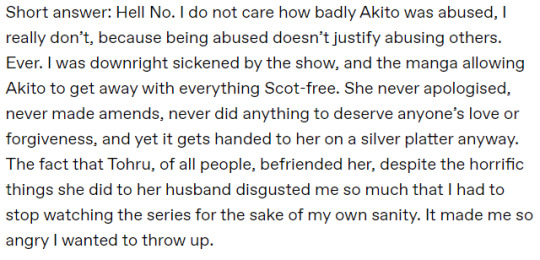
No duh on "being abused doesn't justify abusing others", but you might want to tell that to all the stans and simps for (usually male) villains who were abused and took their inexcusable actions towards others even further than Akito would've ever dared to yet they get their crimes downplayed or even defended and rationalized with "the abuse they suffered made them into people who act this way, don't judge the way any abuse victim internalizes and externalizes their trauma from the abuse they experienced, there is no 'perfect victim' y'know?", and are said to "deserve better" or "deserve" redemption.
The idea that Akito "got away with everything Scot-free" seems like a really poor reading of the story based on only the notion that if Akito is not dead, locked up in a penitentiary or asylum, or left completely alone and miserable forever by the end of the story, she faced zero consequences for her actions. Totally disregarding how almost the entirety of what the 2019 anime has as its final season was reality coming in to smack Akito around repeatedly and make her face all the natural consequences of her actions, of how she'd lived her life and ruled over her family as an abusive tyrant. See this? All of this?:
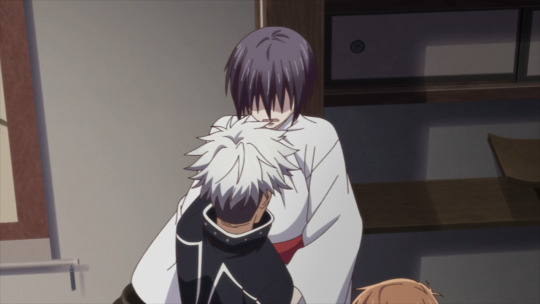
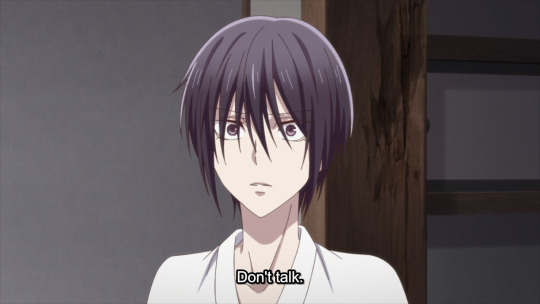

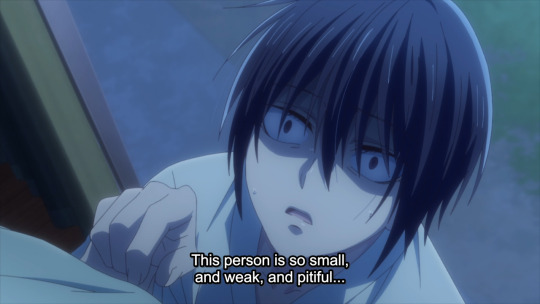
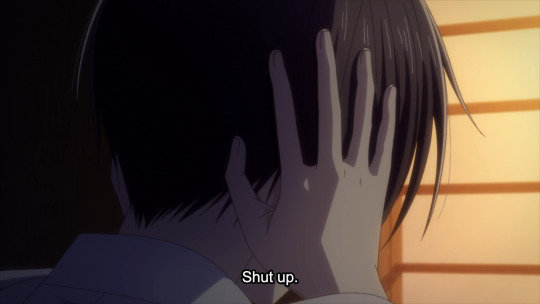

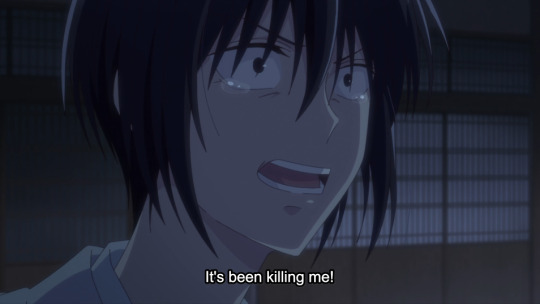


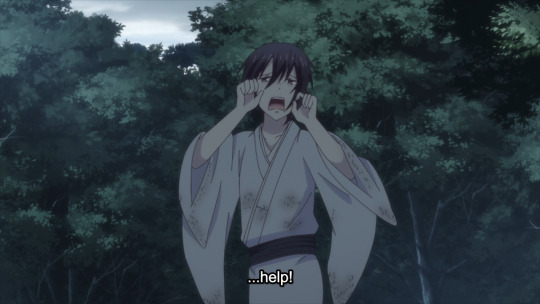
This is all Akito's karma. It's from the punishment she wrought for herself. The misery she passed around through her family came back around in full, and she had to watch her entire world, the world of the "eternal banquet" she was promised and believed herself entitled to, gradually unravel along with her own mental and emotional state.
In the anime at least, it hits a crescendo that's regretably so brief and silent that it's easy to miss, but when Akito has mentally shut down and is just sitting there moping beside Shigure, we're shown a bit where she suddenly gets up, like she just hit a breaking point and without any thought, just on pure instinct and emotional impulse, she walks to the screen door and hits her head against it. Given her frail, shaky body language, and the mix of alarm and pity that lurks beneath Shigure's still calm facade, I'm to assume that Akito is wailing and screaming. She's having a full psychotic breakdown.
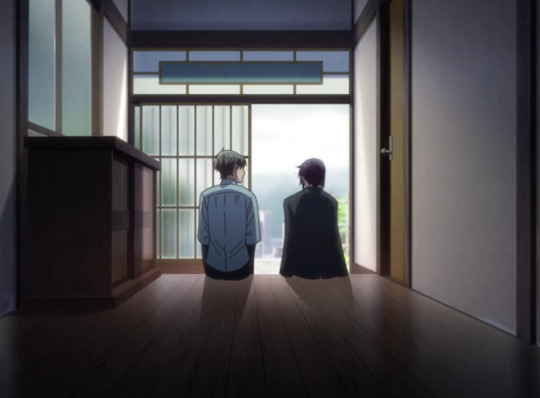

"She never apologized, never made amends, never did anything to deserve anyone's love and forgiveness". ...I'm sorry, this person really stopped watching after Tohru got put in the hospital, huh? In the last couple of episodes, Akito did nothing BUT be apologetic and set out to make whatever amends she could, including undoing all remaining bonds and breaking the Zodiac curse! She did nothing to "deserve" anyone's love and forgiveness even at this point because now she at last understood she was undeserving of such things and was entitled to nothing, especially nothing from her victims, after the way she'd behaved and the many sins she'd committed. Forgiveness is earned and granted, never "deserved", and it's always a choice whether or not to grant it, so anyone who'd never forgive Akito for as long as they lived would be entirely within their right to do so, and so would be those who did make the choice to forgive her. Neither is invalid. And love is never a matter of "earned", "deserved", or "owed", and to think that it IS is ironically adopting a very Akito mentality.
Also have to go back to that "she never apologized" thing. Really?
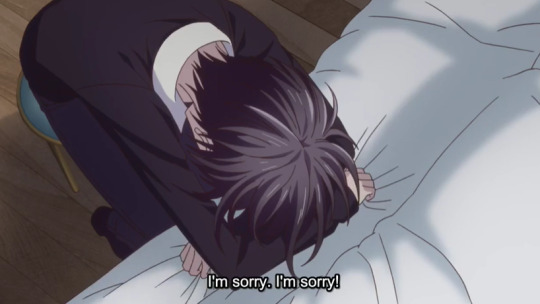
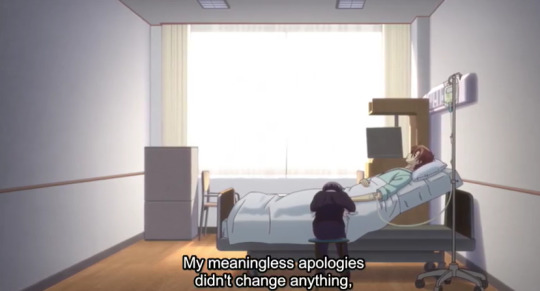

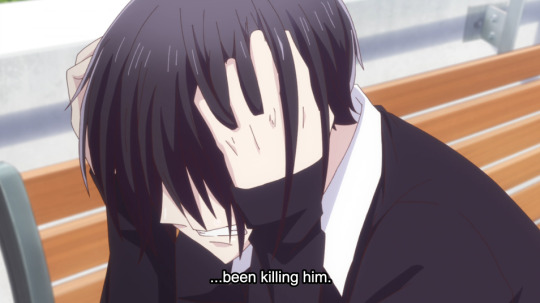
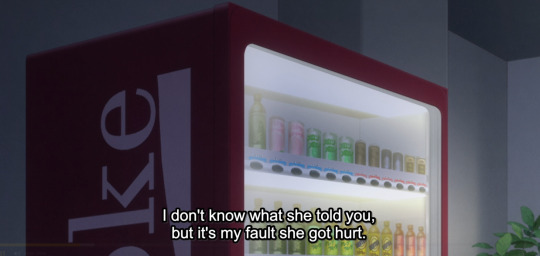
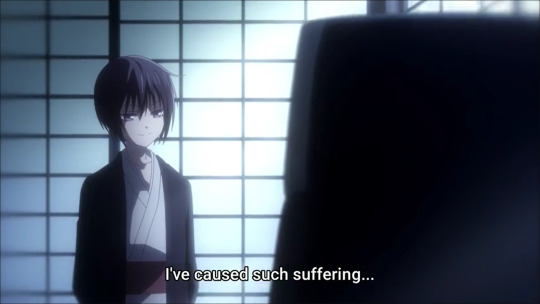
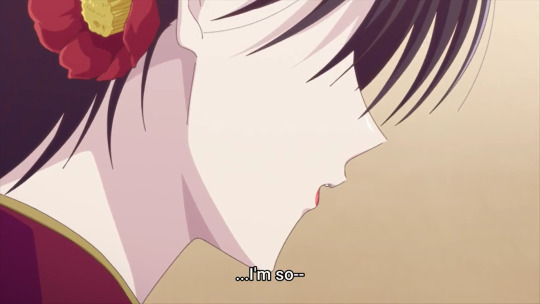
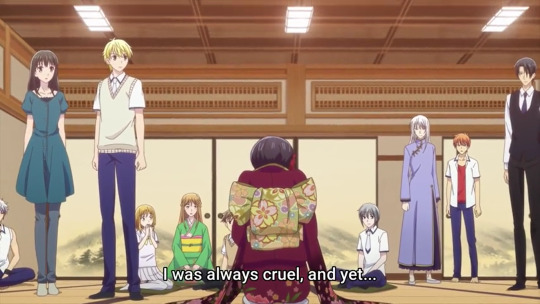
Really?
And if "that Tohru, of all people, befriended her despite the horrific things she did to her (not yet and in fact he'd just rejected her) husband" disgusts anyone, than Fruits Basket was never the story for them and Tohru was never a character they were going to love. That moment, and that gesture from Tohru, was one of THE core pillars of the entire narrative, something everything had been building up to from the very beginning. Tohru looked deep inside the cruel, childish, deranged, abusive, controlling, possessive, selfish, cowardly, downright evil pseudo-god that she, and the entire Sohma family, knew as Akito Sohma and she found who Akito Sohma truly was: a sad, abused, broken, twisted, pathetic, wretched, needy and terrified child who'd suffered through an upbringing in which she'd never been allowed to forge a single human connection with anyone else that was not dependent upon her status as the family head and the bonds with the Zodiacs that was her promised birthright, and was thus left with so much vulnerability, so much mental and emotional instability, such fear of living her life in the world as the woman she should be, as the human being she should be, that she kept concealed beneath the armor of a wrathful god who she felt could be comfortably in control of everything in her life and keep it all from slipping away from her and leaving her all alone with all her internal anguish and misery. It's that Akito Sohma who Tohru reached out to and extended the offer of friendship, to become her first ever true human friend in her life, no string attached and no bonds or godhood required. Because that's what Fruits Basket was always all about: the existence and value of love. family, and friendships as forged, mutual, equally consensual connections between humans rather than as some divine mandate upon animals or some commodity to be horded by a god.

Already took shots at "she gets away with everying and does nothing to deserve anyone's love or forgiveness". On the belief that Akito needed to be jailed for her crimes, that is actually something I can agree with and see as a weakness in the series' ending. Once the Zodiac curse was broken and Akito was no longer "God", there'd now be nothing standing in the way of some of the Sohmas, the family members and servants alike, pushing charges against Akito for all the worst things she'd committed against them. We should've been told that such legal action was taken and that Akito knew it was coming and accepted it, being fully ready to accept accountability and justice for her crimes. When last we'd see her and Shigure, they could be doing a round of community service together! That would've been perfect! But Takaya didn't go that route, and I think what we did got was also satisfactory: Akito had lived her life with power, privileges, and freedom with which to do whatever she wanted but was also a prisoner of her own damaged psyche and of the broken family system she was born into and had to play such a large role in perpetuating, so by the end, it's now flipped so that Akito has been internally set free, is healing and finding inner peace, but without the Zodiac curse, the family headship in a lonelier, harder, constraining position but she voluntarily endures with it so that she may live the rest of her life atoning for the sins she'd committed when she was "God", all at a distance from family members who mostly will never forgive her, never think any better of her, and are glad to be free of her. So the idea that Akito's fate not being punitive enough being akin to a slap on the wrist is misguided. It's a lifelong committment to restorative justice and not getting all she desired that Akito's made, and she has to endure it while being romantically involved with Shigure, which honestly feels like a punishment worse than prison!
Piss the fuck off with the "blatant abuse apologist" claim, too. This is the same bullcrap spewed towards Kohei Horikoshi when he gave Endeavor a self improvement/atonement arc. WIth both Endeavor and Akito, the narrative is never at any point remotely pretending that their actions are anything but monstrously abusive, toxic, cruel, harmful and wrong. They're bad and so the abuser is made to feel bad about having ever done them and must face up to all the natural karmic consequences that will inconvenience their lives. An anti-abuse narrative that does not keep it as simple and black-and-white as "the abuser is 100% Bad Person, it's a problem that they exist and hurt people, the solution is to remove them from life entirely" yet still condemns the abuser for their actions and champions their victims ability to move beyond them, find healing, peace, love, and happiness in lives better than what the abuser could ever hope for, is not in the slightest bit "abuse apologism": no apologies or excuses for the abuse are being made.

Not Akito-related, just showing how this same person truly feels about Fruits Basket on the whole due to how "problematic" it is. If it's not for you, fine, and this is actually 100% correct regarding Katsuya Honda being a sociopathic predator who fucked a child student of his yet it get beyond inappropriately framed as a beautiful, romantic, loving thing within the narrative. But when it reaches this hyperbolic "the entire series has no value, it's irredeemable media and deserves to be trashed" level of vitriol for the work...nah. That's not agreeable.
And then there's this anon who called in to say:
Seeing you rightfully call out the utter bullshit of Akito's "redemption" has me heated. The story becomes irredeemably bad the moment the forgiveness shit is pushed.
Let me say this much: there was no "redemption" or "redemption arc" for Akito. She had her big epiphany and recieved personal salvation from Tohru's approach to her, and from then on she turned herself towards self-improvement and atonement for her many sins while finally living a true human life of her own. Atonement /=/ redemption, as all avenues for her to redeem herself for her abusive acts directly to those effected by said abusive acts got closed off a long time ago.
And forgiveness is entirely another matter from redemption and atonement. Tohru, Kureno, Shigure, Momiji, Arisa, and Saki chose to forgive Akito. Literally no one else was shown to do so. Rin even said outright she could never forgive Akito after everything she did, and in the anime at least, she was positioned as not in the wrong for that.
Takaya is on my shit list for life for how she handled Tohru's character, she is my favourite I love her compassion for people and her determination to never give up despite how difficult things can be plus her learning to move on from her crippling grief resonates with me. The ending Takaya gives her is fucking vile Tohru forgiving and befriending Akito is bullshit and my mind is never going to change on that.
"I love her compassion for people." "Tohru forgiving and befriending Akito is bullshit!" Do...you not see how these are conflicting ideas? "Tohru is wonderful for how much empathy and compassion she has for people...wait no, not THAT people!" How do you miss that big?
The sole reason Tohru wants to break the curse is because she sees how much her friends are suffering under Akito's abuse both mentally and physically. She would never be so inconsiderate of their feelings as to befriend the person who hurt them so much.
And she also saw how much Akito herself was suffering under the curse and the role that was forced upon her from birth. Also, how is choosing to befriend her friends abuser inconsiderate when they don't need to factor into it at all? Tohru doesn't try to force Yuki, Kyo, Rin, Momiji, Hiro, Kisa and the rest to also be friends with Akito. She at no point even considers that possibility. What's between Tohru and Akito is kept purely between them, away from Akito's victims. Tohru understands that they'd never be comfortable around Akito due to having a history with her that Tohru herself does not have, and while she wants to help Akito move past her pain and put in the good work to make reparations for her sins, she's not going to ever downplay how vile those sins were and how badly they hurt people, nor would she put up even the pretense of giving absolution of them to Akito.
That's not even getting to my other major problem with this storyline Tohru never even learns about half of the horrific shit Akito does to her friends, Takaya intentionally has her character be left in the dark. Not to mention how abusive akito is to HER!
Why does it need to be Tohru's business to know absolutely every horrible deed Akito ever did to every person she was ever horrible to? Akito did that shit, it happened, there's nothing Tohru can do that could possibly change that or make any of it better. And oh dear, are we getting into the "antagonistic behavior = abuse" bullshit again?
She manipulates her the first time they meet and then at the beach house she threatens her and scratches up her face. Tohru outright admits she is scared of her. Then towards the end of the story akito then has the audacity to blame her for the zodiacs not loving her despite that being the consequences of her own disgusting actions. She shows up at the house to hurt and potentially kill Tohru, she slaps her multiple times, stabs her and pushes her close to the cliffs end directly putting her in danger. Akito almost gets the poor girl killed. Akito spends the entire story being an abusive monster to Tohru and the people she loves. And nearly leads to multiple characters dying, Takaya really wants us to think a friendship Between the two of them is cute because they both relate to being lonely????
Ah yes. Yes we are. Most of what's described above is Akito being a cruel villain and acting as a threatening adversary to Tohru, with actions that are clearly reprehensible and uncalled for but are not inherently "abusive", as Akito is treating a stranger badly and making enemies with her rather than being in any relationship in which she can treat her abusively. The hardest into abuse it ever swings is when Akito is holding a knife to Tohru and physically strikes her, and that's when Akito is in the midst of a full-blown psychotic episode.
And that the characters apparently aren't that different to each other??? When they clearly are. Tohru is a kind and compassionate person who helps those around her while Akito is a manipulative snake who treats those around her like they are her possessions. Tohru grows up being bullied and alone. Akito is a child abuser and commits multiple attempted murders. Trust me Takaya these characters aside from them having tragic backstories and fears of abandonment are as far away from each other as you can get.
Tohru was brought up to be kind and selfless, to the point of seeing her own self as lesser in value than others. Akito's upbringing shaped her into becoming cruel and selfish, to the point of seeing others as possessions for her to keep hold of, to pleasure her with a sense of superiorty as a cover for her own poor self image and lack of self-worth. Tohru was left alone without her mother and was ostracized by her peers. Akito was left alone without her father (as her own mother would never give her the time of day) and was "othered" by literally every person around her. They're foils. Akito is a broken reflection of what Tohru might've become if Kyoko had not put in that effort to be such a kind, loving, nurturing parent, and Akito always envied Tohru because she reflects the girl she might've been had she been allowed to be, and not internalized everything wrong with the Sohma family nor adopted her mother's own internalized misogyny.
The friendship is disgusting, Akito is an evil bitch period she is not Tohru's problem or her responsibility. Also Uo and Hana being friends with her after they find out she nearly killed their best friend and Kureno was also so gross. The characters do some of the most OOC shit in order to give Akito one of the least deserving redemption arcs i have ever seen. It is truly some of the most atrocious, insulting writing, Takaya should be embarrassed for thinking this was an acceptable way to end the story.
If you want to get technical, none of the Sohmas are Tohru's problem or responsibility. It's not on her to "fix" them or be their therapist and savior, she doesn't owe them anything. She chooses to help them out of compassion, empathy, and a desire to do right by others, to see true justice done and freedom, peace, and happiness assured for the people she cares about in their lives going forward, With Akito too, she did not impose or make her into her responsibility; she extended her hand. She offered Akito a choice. The friendship would not happen if Akito decided she was unwilling to put in the effort to do her part and accept the care, help, comfort and understanding offered to her by Tohru. So yeah, you can blame Akito for that too, even though it's not a wrong thing of her to do whatsoever! Uotani also did not become Akito's friend, more like a friendly acquaintance. Hanajima did follow Tohru's lead and befriend her, and considering she knows how it feels to internally tear yourself apart with self-loathing over guilt from having hurt people to the point of cursing your very identity and existence, I'd say her decision makes sense.
I haven't read the spin off but Akito having a child just reinforces that she is still the same selfish person she has always been. Her wanting to have children but deciding not to because of how they would suffer due to her terrible actions would actually mean she has to live with the consequences of what she has done. but of course we can't have that.
Meh. Not much a fan of that spin off and I'm kind of hoping we don't get it adapted into an anime. Some things are best left open-ended.
#Fruits Basket#manga#anime#Akito Sohma#Tohru Honda#fandumb#hatedumb#haters#opinion#criticism#female characters#friendship#friends#forgiveness#redemption#love redeems#misaimed fandom#completely missing the point#defense#truth hurts#she's not a complete monster!#tw: abuse#tw: child abuse#tw: rape
17 notes
·
View notes